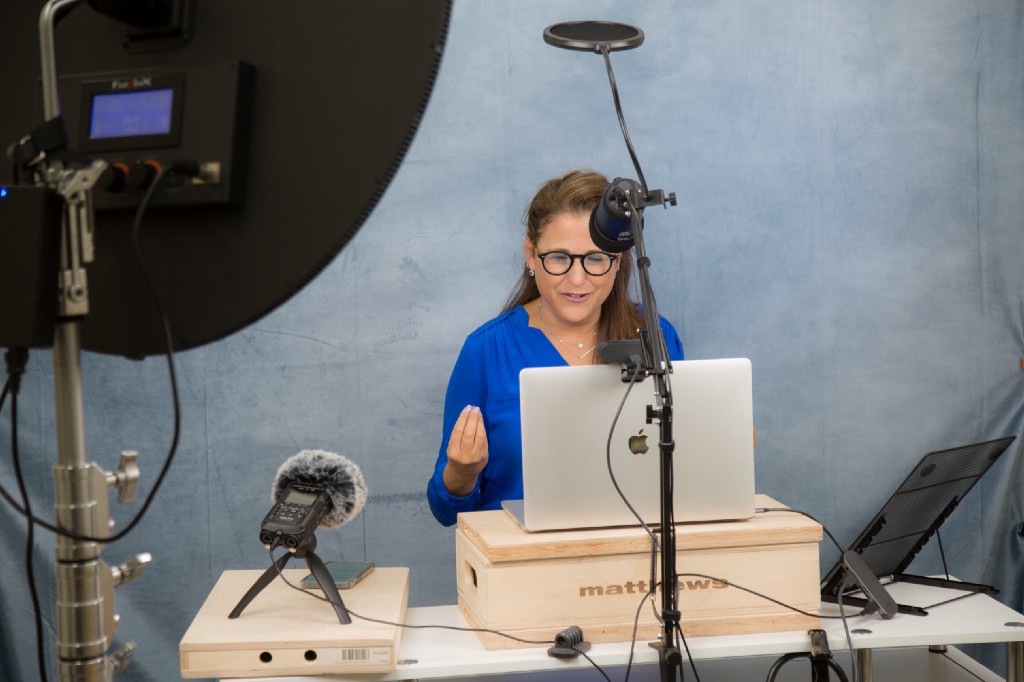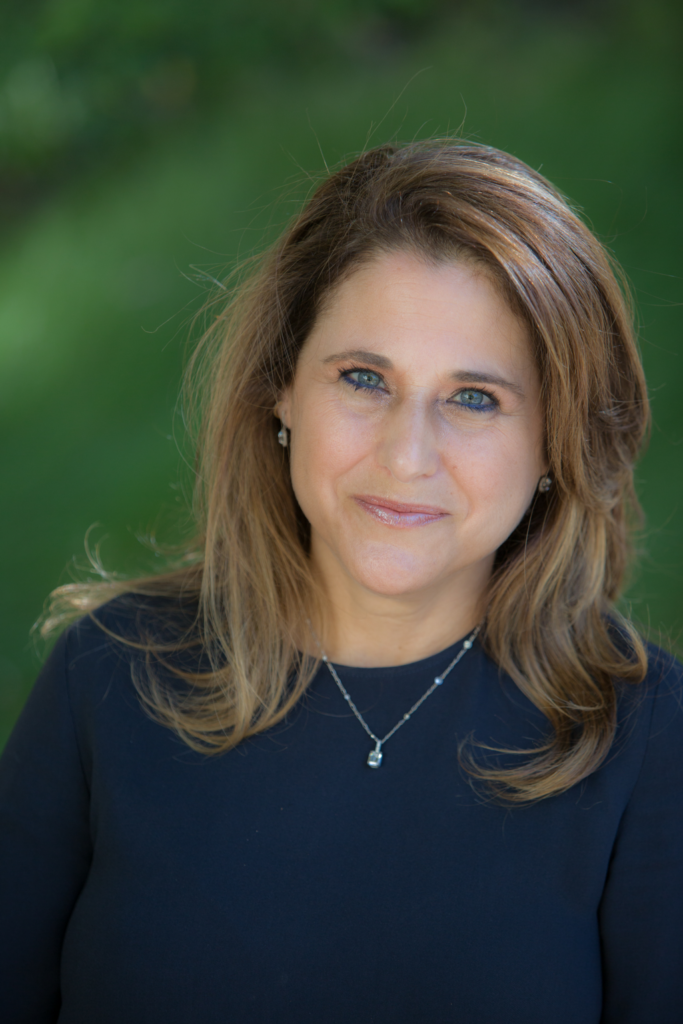Social Impact Tech: Rabbi Sherre Hirsch Of Maven On How Their Technology Will Make An Important Positive Impact
An Interview With Jilea Hemmings
If technology “created” the problem of isolation and loneliness, then I believe the solution to this problem lies within technology. By providing a platform where Jewish experts, thought leaders, authors, philanthropists, and celebrities can come together and share their wisdom to all via technology, we can enable people to see that human beings are human beings regardless of religion, race, or creed and that we all share a deep humanity that is rooted in the truth that we’re more alike than different.
In recent years, Big Tech has gotten a bad rep. But of course many tech companies are doing important work making monumental positive changes to society, health, and the environment. To highlight these, we started a new interview series about “Technology Making An Important Positive Social Impact”. We are interviewing leaders of tech companies who are creating or have created a tech product that is helping to make a positive change in people’s lives or the environment. As a part of this series, I had the pleasure of interviewing Rabbi Sherre Hirsch.
Rabbi Sherre Hirsch is a soul entrepreneur blending her passion for technology with her passion for spirituality. After serving as a congregational rabbi at Sinai Temple, the largest Conservative synagogue in Los Angeles, she pivoted to bring her wisdom to the masses. Rabbi Hirsch has built a loyal following from her work as a Spiritual Commentator on the Today Show and numerous appearances on ABC News, Extra, and PBS and from publishing her two books with Penguin Random House. She has gained notoriety as the go-to expert on how to get unstuck in both your personal and professional life. She lives what she preaches, having launched multiple ventures from ideation to actualization. She was the Senior Rabbinic Scholar at Hillel International where she created and developed Hillelwell, an initiative that brought together Jewish college students around the country to address mental health issues. Most recently, she became the Chief Innovation Officer of American Jewish University where she created Maven, a tech platform, and which she hopes becomes the destination for audiences worldwide to discover the power of Jewish wisdom regardless of their background or beliefs.
Thank you so much for joining us in this interview series. Before we dive in, our readers would love to learn a bit more about you. Can you tell us a bit about your childhood backstory and how you grew up?
From an early age, my parents taught me how to be self-reliant and resourceful. My family owned a retail lighting store in the local mall, and my job was to count the register and stack the lightbulbs. While I loved being part of the business, school and learning were my savior. I attended a private school with a handful of Jews, and that experience taught me about navigating the world, the power of embracing your identity, and the meaning of success. While there were many rabbis in my extended family, I didn’t grow up in a religious home. My family and I embraced the traditions and the teachings, but I always gravitated toward the structure Judaism provided and Jewish values on a different level.
By the time I turned 18, my parents’ marriage had crumbled, my brother was on his own path, and I declared my financial independence. I left home for good and take incredible pride in taking that step as it led me to live a life defined by resilience and grit. Living without a safety net as a teenager was the best gift I could’ve ever given myself, and I’m grateful I made that decision every single day.
None of us are able to achieve success without some help along the way. Is there a particular person who you are grateful towards who helped get you to where you are? Can you share a story about that?
In college, I majored in American Culture and was studying with an Orthodox rabbi who casually mentioned after one of our sessions of learning that he thought I would be a great rabbi. At the time, women had just started becoming ordained as clergy, but it was very rare. I had been thinking about becoming a rabbi long before it was possible, but up until that moment I could not even admit that to myself. I knew a seed had been planted that I could not ignore and that my life trajectory was about to pivot. When I lecture, I often comment that a person can say something complimentary or critical in passing without much thought, that can leave an indent forever in your mind and ultimately change how you chart your course. I often think about the rabbi who made that small comment to me because his words had a colossal impact on my life.
Can you please give us your favorite “Life Lesson Quote”? Can you share how that was relevant to you in your life?
Luck is the residue of design. Many people see my career and my life and think, “She is ‘lucky,’” but they never see the thank you notes that I am writing at four in the morning or the multiple failures that came before the success they see. I believe in numbers and that life is a numbers game.
You are a successful business leader. Which three character traits do you think were most instrumental to your success? Can you please share a story or example for each?
- Grit
I think that no means not yet or not now. I believe in no, but I don’t always think when I hear it that it is the right answer. It is not right for this moment.
- Self-regulation
Earlier in my career, I had a harder time taking the high road and often veered into inconsequential squabbles and arguments because I wanted justice for all. I am less self-righteous now and more self-regulated.
- Faith
I hold strong beliefs that each human is equipped to integrate the challenges and obstacles they face in their lives. This does not mean that everything turns out okay in the end or time heals all wounds. Rather, it means that after the losses we are able to find meaning in them and find the strength to go on.
Ok super. Let’s now shift to the main part of our discussion about the tech tools that you are helping to create that can make a positive social impact on our society. To begin, what problems are you aiming to solve?
I show up to work everyday with one goal in mind: to enable individuals and communities to feel more connected in a more isolated and lonely world.
How do you think your technology can address this?
If technology “created” the problem of isolation and loneliness, then I believe the solution to this problem lies within technology. By providing a platform where Jewish experts, thought leaders, authors, philanthropists, and celebrities can come together and share their wisdom to all via technology, we can enable people to see that human beings are human beings regardless of religion, race, or creed and that we all share a deep humanity that is rooted in the truth that we’re more alike than different.
Can you tell us the backstory about what inspired you to originally feel passionate about this cause?
As a rabbi, Chief Innovation Officer, tech founder, and parent, I know people are lonely. If you pin this problem on social media, and amplify it due to the pandemic, you’re left with a society that feels more isolated than ever. I’ve seen that it does not matter if you are extremely wealthy, famous, or even surrounded by a huge extended family. With the advent of social media, depression, mental illness, and isolation, mental health cases have skyrocketed. Like many of us, I’ve read the data, but I’ve also noticed this issue in every one of my pastoral meetings. And then I noticed it in my home. I knew that I was in the unique position as a connector, thought leader, and entrepreneur to approach solving this problem with a new lens. When I was the Senior Rabbinic Scholar for Hillel, a Jewish organization that serves college students, I was on a mission to address this issue head on. Once I moved into my role at AJU my mission expanded beyond young adults. I was fortunate to have a baseline from my days at Hillel to see that my approach would be successful regardless of age and brought my knowledge of how to reach people and build community to AJU.
In your opinion, what gives Maven it’s unique competitive advantage?
At its core, Maven is a tech platform that provides LIVE events focusing on amplifying Jewish wisdom in the world. We offer exclusive and original content. Each of our conversations is hosted by our esteemed faculty. Since our institution is not tied to any affiliation, denomination, or political doctrine, we have worked with a long list of partners. We have been able to elevate other institutions by giving them our content that they can brand themselves.

How do you think your platform might change the world?
In a world of echo chambers and silos, Maven bridges the gap between individuals and communities. People find themselves in online conversations that they wouldn’t dare to engage in face-to-face. We are redefining what it means to be part of a community by giving our participants the opportunity to join a safe space and leave their echo chambers from the comfort of their living room.
Here is the main question for our discussion. Based on your experience and success, can you please share “Five things you need to know to successfully create technology that can make a positive social impact”? (Please share a story or an example, for each.)
- Hire People Who Are Better Than You.
I know I don’t know the answer to everything; however, my secret weapon is that I know how to hire the people who do have answers, and then I make it a point to get out of their way.
2. Lean into Peoples’ Strengths.
I take time to discover where people excel and let them excel. I don’t go to a hardware store for milk.
3. Redefine the Customer.
I believe every single person who works with Maven, works for Maven, or simply uses Maven is our customer. Some of the best feedback I have received about our platform has come from our web designers, coders, a Christian user in Wichita, and a Jewish grandmother in Chicago. We value what everyone has to say at every level of this process.
4. Write Personal Thank You Notes.
I write five personal notes every Friday and put them in the mail. What this practice has given me, and what I have received in response, is immeasurable.
5. Integrity, Excellence and Transparency.
I lead by these three words. When we are working with others, there are bound to be difficulties and conflict. However, when a challenge arises, I ask: Is there integrity, excellence and transparency? If my team cannot answer yes to all three, we know what we need to do.
If you could tell other young people one thing, what would you tell them?
Many of us are making decisions based on fear. I want you to ask yourself: how would my life be different if I made decisions based on faith instead?
How can our readers further follow your work online?
Thank you so much for joining us. This was very inspirational, and we wish you continued success in your important work.
Social Impact Tech: Rabbi Sherre Hirsch Of Maven On How Their Technology Will Make An Important… was originally published in Authority Magazine on Medium, where people are continuing the conversation by highlighting and responding to this story.
